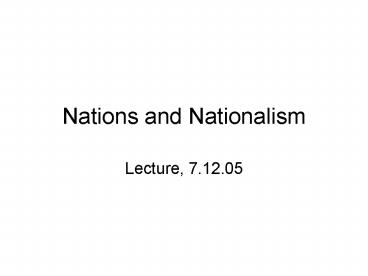Nations and Nationalism PowerPoint PPT Presentation
1 / 12
Title: Nations and Nationalism
1
Nations and Nationalism
- Lecture, 7.12.05
2
Definitions
- The term nationalism is generally used to
describe two phenomena (1) the attitude that the
members of a nation have when they care about
their national identity and (2) the actions that
the members of a nation take when seeking to
achieve (or sustain) self-determination. - (1) raises questions about the concept of nation
(or national identity), which is often defined in
terms of common origin, ethnicity, or cultural
ties, and while an individuals membership in a
nation is often regarded as involuntary. - (2) raises questions about self-determination
understood as having full statehood with complete
authority over domestic and international affairs.
3
The Concept of Nation
- In its general form, the issue of nationalism
concerns the mapping between the ethno-cultural
domain (featuring ethno-cultural groups or
nations) and the domain of political
organization. - Pro-nationalist thinkers have therefore been
elaborating theories of ethnicity, culture,
nation and state. - Nationalist claims typically are focused upon the
non-voluntary community of common origin,
language, tradition and culture, so that in the
classical view an ethno-nation is a community of
origin and culture, including prominently a
language and customs. - Nationality refers to a common ethno-cultural
background which determines one's membership in
the community.
4
Fundaments of Nationalist Claims
- Traditional the spirit of a people,collective
mentality, national character as forms of
life and of feeling. - Modern National identity (real or imagined)
5
Identification of state and people
- Nationalism, translated into politics, implies
the identification of the state or nation with
the people. - In the age of nationalism and since then the
principle was generally recognized that each
nationality should form a stateits stateand
that the state should include all members of that
nationality.
6
Culture and Politics
- From the end of the 18th century on, the
nationalization of education and public life went
hand in hand with the nationalization of states
and political loyalties. - Poets and scholars began to emphasize cultural
nationalism first. They reformed the mother
tongue, elevated it to the rank of a literary
language, and delved deep into the national past.
- Thus they prepared the foundations for the
political claims for national statehood soon to
be raised by the people in whom they had kindled
the spirit. - National poets, national writers, national
composers become the first heroes of nations. - Under the influence of the new theories of the
sovereignty of the people and the rights of man,
the people (as carries of national culture)
replaced the king as the centre of the nation.
7
History 18th century
- The first full manifestation of modern
nationalism occurred in 17th-century England, in
the Puritan revolution. - The nationalism of the 18th century had a strong
enthusiasm for liberty, its humanitarian
character, its emphasis upon the individual and
his rights and upon the human community as above
all national divisions (French revolution,
American revolution)
8
History 19th century
- German nationalism began to stress instinct
against reason the power of historical tradition
against rational attempts at progress and a more
just order the historical differences between
nations rather than their common aspirations. - One of the consequences of World War I was the
triumph of nationalism in central and eastern
Europe.
9
Asian and African Nationalism
- Nationalism began to appear in Asia and Africa
after World War I - It produced such leaders as Kemal Atatürk in
Turkey, Sa'd Pasha Zaghul in Egypt, Ibn Sa'ud in
the Arabian peninsula, Mahatma Gandhi in India,
and Sun Yat-sen in China. - New States Rapid increase of nation states in
the world since WW I. - Many new nations, all sharing the same pride in
independence, faced difficulties.
10
Sun Yat-sen (1866 - 1925)
- Leader of the Chinese Revolution
- 1911 Qing Dynasty is overthrown
- Revolutionary Ideology Three Principles of the
People (Sanmin Zhuyi) - 1) Nationalism (MINzu)
- 2) Democracy (MINquan)
- 3) Socialism (MINsheng)
- Problem Minorities, territory
11
The Debate on Nationalism I
- Pronationalist Arguments
- The first set of arguments defends the claim that
national communities have a high value, often
seen as non-instrumental and independent of the
wishes and choices of their individual members,
and argues that they should therefore be
protected by means of state and official statist
policies. - The second set encompasses arguments from the
requirements of justice, rather independent from
substantial assumptions about culture and
cultural values. They appeal to circumstances
that would make nationalist policies reasonable
(or permissible or even mandatory), such as the
fact that a large part of the world is organized
into nation states or the circumstances of group
self-defense or of redress of past injustice that
might justify nationalist policies.
12
The Debate on Nationalism II
- Critical Arguments
- The alleged special duties towards one's
ethno-national culture can interfere, and often
do interfere, with individuals right to
autonomy. - Most ethno-national communities are divers, which
can be thwarted by the homogeneity of a central
national culture. - A widespread variant of nationalism is the
invidious particularistic form claiming rights
for one's own people and denying them to others.

